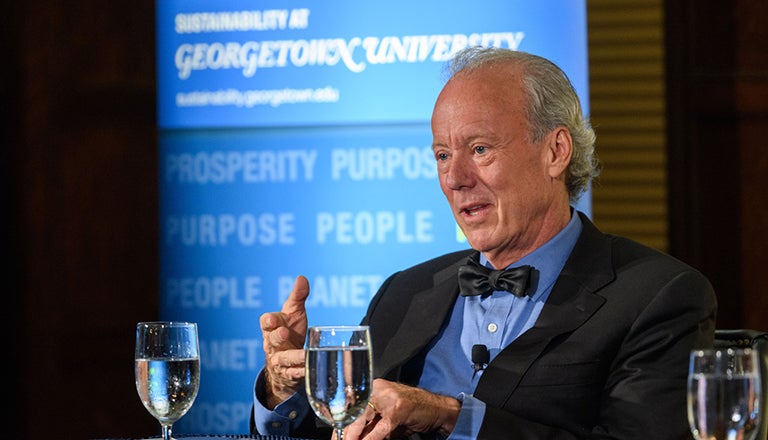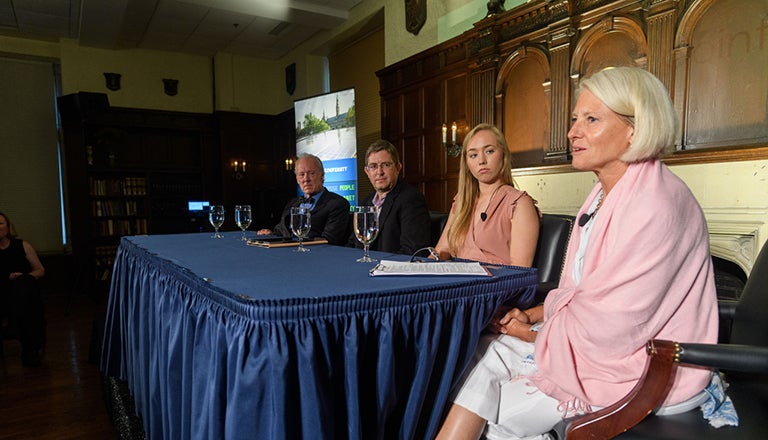Title: Sustainability Leader, Faculty and Students Urge Focus on Reducing Plastic
The Georgetown community hears from a sustainability thought leader, a faculty member, a student and the university president on our global plastics crisis, alternatives to plastics and other measures to create a healthy campus and planet.

The Georgetown community heard from a sustainability thought leader, a faculty member, a student and the university president earlier this week on our global plastics crisis, alternatives to plastics and other measures to create a healthy campus and planet.
William McDonough, a circular economy and sustainable development expert with William McDonough + Partners, noted at the Sept. 5 event that 18 billion pounds of plastic are being dumped into the world’s oceans every year and that more than 90 percent of bottled water contains microplastics harmful to humans.
“Let’s design everything to be reusable, recyclable, compostable, but also recoverable,” said McDonough, author of Cradle to Cradle: Remaking the Way We Make Things and The Upcycle: Beyond Sustainability – Designing for Abundance. “If we can design for end of use, we can design for next use.”
Laudato Si’
In introducing McDonough, Georgetown President John J. DeGioia noted that the expert’s ideas have a “deep resonance with the words of Pope Francis,”whom he said encourages people in his 2015 encyclical Laudato Si’with the following aspiration: “May our struggles and concerns for this planet never take away the joy of our hope.”
McDonough, who is collaborating with the university as part of its efforts to create a sustainable future, said new, healthier materials can be designed comprising compostable polymers and coatings on paper, which could replace current packaging and result in a reduction of harmful plastics in the environment.
The strategic sustainability planning effort and the university’s engagement with William McDonough + Partners is supported by philanthropy.
McDonough, following his keynote address on plastics, took part in a panel discussion moderated by Elle Carberry, Georgetown’s vice president for corporate engagement.
Imagining Change

Carberry and McDonough were joined by chemistry department chair Timothy Warren, who leads the Georgetown Environment Initiative, and Georgetown student Caroline Bonfield (C’19), president of the GU Sustainable Oceans Alliance.
“What could you imagine us doing here on campus to really innovate and change and break the linear model and go into a circular model, for all the materials and their flows?” Carberry asked.
Bonfield encouraged the community to think about their footprint on the environment, and noted that she daily brings with her a metal straw, a coffee mug, a water bottle, a metal fork, knife and spoon as well as a reusable grocery bag so she doesn’t have to use plastics.
“Just anticipate what you might need for that day and bring it along with you,” she said. “Think about your actions and how they impact the rest of the environment around you and try and be a champion for the environment and set a kind of culture of eco-living wherever you go.”
‘Generations to Come’
Warren talked about the importance of interdisciplinary research in solving issues of sustainability and urged people to work together to come up with new ideas.
“If you’re able to make that connection to the environment and to create a set of ideas that then themselves inspire greater sustainability, those ideas themselves do become sustainable and that impact is going to be felt for many generations to come,” Warren said. “And that’s really what a lot of us strive for as faculty, as lifelong students and students here at Georgetown.”
Georgetown University’s Office of Sustainability, Urban and Regional Planning Program, the Global Cities Initiative, the Mid-Atlantic Center for Children’s Health and the Environment, Georgetown Sustainable Oceans Alliance and the Georgetown Environment Initiative hosted the event, which was preceded and followed by smaller working sessions as part of the university’s ongoing strategic sustainability planning process.